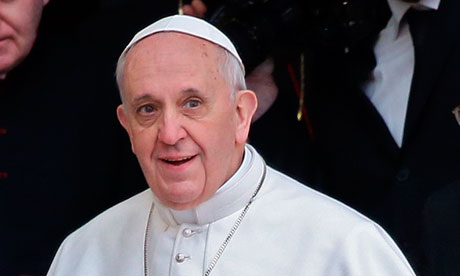Since the day black smoke came out of Vatican, we haven’t been able to stop talking about him. He still wears hats and robes and prays with Mary, but we love him anyway. In an evangelical culture starved for meaningful examples of the way of Jesus, Pope Francis is the new Billy Graham.
All branches of the Christian faith are dealing with an identity crisis. With their social capital and political power waning, evangelicals specifically have struggled to find themselves. For many the answer was to rediscover the church’s call to social justice. Suddenly everyone wanted to build a well or adopt a kid.

It can be hard for socially minded evangelicals to find their place. The specter of the social gospel schism that created today’s Mainliners and Fundamentalists made Evangelicals many feel uncomfortable with the relationship between serving the poor and preaching repentance.
Some hoped that this new wave of socially active believers would help restore evangelicalism after years of being married to the political right. But many boots-on-the-ground evangelical activists found themselves alone or at odds with their local church.
Amidst this disillusionment (combined with a previous disillusionment with the emergent movement) came a new conversation around being “missional.” The modern missional movement was based in an understanding that the church had lost it’s privileged place in society. The only way to respond was to start acting like missionaries.
Theoretically, “missional” should provide a framework for evangelism, discipleship and serving the poor. God is a missionary, coming to his people with tangible good news. Despite endless books, blogs and conferences, it is still hard to point to a tangible example of who is missional or what it means.
The whole world knows about the problems of the Catholic Church, too. For years, “priest” was synonymous with child molester. Yet it feels like this conversation almost immediately disappeared with the arrival of Francis.
Perhaps the real reason that Francis is beloved of everyone from dormant Catholics to the mainstream media to burned out post-Protestants is that he wants his church to be missional.
Francis’s commitment to mission is seen in five ways.
1. He doesn’t seem like a celebrity
Francis does not seem like he wants to be Pope. Like a good Jesuit, he rejected the fancy Vatican palace for a simple living arrangement. In a culture where evangelical celebrities are making headlines for building mansions and plagarizing, the Pope seems to embrace the spotlight with reluctance.
2. His intentions seem obvious
Saint Francis of Assisi was not only known his vow of poverty, but for his love of evangelism. By taking this name, the Pope made it clear where he would be redirecting the focus of the Church outward.
3. He seems gleefully subversive
Listening to the Pope, you get the feeling that he is completely comfortable with himself. He doesn’t care what you think. People ask him about contraception or homosexuality or atheists, he responds in a way that makes everyone ask themselves “why do we make such a big deal about this?”
4. He models his love for the poor
Of all of the headlines this year, my favorite was “Is Pope Francis Leaving Vatican At Night To Minister To Homeless?” His stinging critique of modern economic inequality holds water because he is actively serving himself.
5. He sounds lot like Jesus
What is most overwhelming for evangelicals is how much the new Pope sounds like Jesus. When Francis says “who am I to judge?” it brings back images of the woman caught in adultery. When he denounces economic inequality, it brings back to mind images of Jesus spending his days with the marginalized.
As I read about Francis’s desire to decentralize the Catholic Church and empower local leaders, I grinned and said out loud “burn it all down, Francis!” At the end of the day, he’s a missionary. He’s going to do whatever he can to make the Catholic establishment a Missionary Church.
There is a list of practices and odd theology a mile look that will continue to keep our churches a part. But for maybe the first time in 500 years, it’s starting to feel like we’re all on the same team.










 Tweets
Tweets